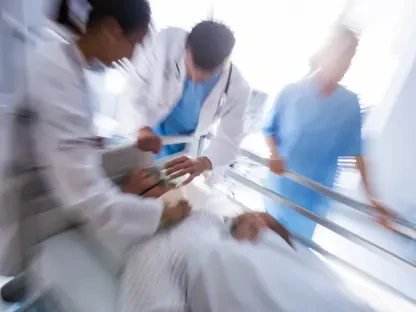Children who’ve contracted COVID-19 face significant long-term health risks, including serious complications affecting the kidney, gut, and cardiovascular systems. Research spearheaded by the Perelman School of Medicine at the University of Pennsylvania offers a comprehensive view of these dangers, forming part of the NIH-backed RECOVER Initiative. By analyzing anonymized data from electronic health records gathered across more than two dozen healthcare institutions, scientists have meticulously documented the various long-term impacts of the virus on young patients.
Kidney Disease
Elevated Risk in General Population
After testing positive for SARS-CoV-2, children showed a markedly increased risk of developing chronic kidney disease (CKD). Specifically, the likelihood of experiencing stage 2 CKD or higher, which indicates mild kidney damage but functional kidneys, rose by 17 percent. More alarmingly, the risk of advancing to stage 3 CKD or higher, implying mild to severe kidney function impairment, increased by 35 percent. These findings emerged through the monitoring of 1,900,146 individuals under the age of 21 from 2020 to 2023. Such elevated risks underscore the necessity for ongoing vigilance and robust kidney-related health monitoring among pediatric COVID survivors.
Extensive tracking also demonstrated a pronounced disparity in kidney health outcomes between children who had tested positive and those who had not contracted COVID-19. Even among those who did not face any initial severe symptoms, the long-term kidney disease risks were significantly elevated. This suggests that the virus has a pervasive, long-lasting impact on kidney health, necessitating a paradigm shift in how pediatric kidney complications are approached post-infection. Regular screenings and early interventions might be crucial to mitigating these risks and ensuring optimal health outcomes for affected children.
Impact on Children with Pre-existing Conditions
Children with pre-existing chronic kidney disease who contracted SARS-CoV-2 faced even graver health consequences. The infection exacerbated their condition, leading to a 15 percent greater risk of severe outcomes such as a significant decline in kidney filtration rate or the need for dialysis or a kidney transplant. This troubling trend was further exacerbated for those who experienced acute kidney injury during the initial infection phase. These children were found to have a 29 percent higher likelihood of adverse kidney events three to six months post-infection compared to their peers without such injuries.
The increased risk in this vulnerable group highlights the necessity for targeted health interventions and more frequent monitoring. Medical practitioners are urged to take these elevated risks into account when treating pediatric COVID survivors, especially those with a history of chronic kidney disease. Comprehensive care strategies, including tailored treatment plans and proactive health assessments, could play a critical role in preventing severe long-term health deterioration in these young patients.
Gastrointestinal Effects
Prevalence of Gastrointestinal Issues
The analysis of 1,576,933 children and adolescents drew attention to a marked increase in gastrointestinal problems post-COVID infection. Children testing positive for SARS-CoV-2 exhibited a 25 percent higher likelihood of suffering from gastrointestinal symptoms during the post-acute phase of the illness. These issues encompassed a wide range of conditions, including abdominal pain, diarrhea, and irritable bowel syndrome, disrupting the affected children’s daily lives and well-being significantly. Such findings underscore the extensive impact of the virus on various body systems, with gastrointestinal health being prominently affected.
Persistent gastrointestinal symptoms can hinder a child’s quality of life, affecting their development and academic performance. Affected children may require ongoing medical attention to control symptoms and prevent further complications. Identifying and managing these conditions promptly could be key to improving the overall health outcomes for pediatric COVID survivors. Health professionals must remain vigilant and proactive in their approach to assessing and treating gastrointestinal problems in this population.
Long-Term Impact
The long-term effects of COVID-19 on children’s gastrointestinal systems extend well beyond the initial recovery phase. The research revealed a 28 percent increase in the risk of developing gastrointestinal issues from six months to two years after initial infection. This prolonged risk reflects the virus’s enduring impact on the gut health of children and adolescents, necessitating continuous medical monitoring and intervention to mitigate long-term detrimental effects. This persistent threat highlights the need for sustained healthcare strategies tailored to address long-term gastrointestinal complications in pediatric patients post-COVID.
The study’s implications point toward the necessity for healthcare providers to adopt comprehensive strategies for long-term evaluation and management of gastrointestinal issues in children recovering from COVID-19. Establishing specialized follow-up protocols could help detect and address these challenging conditions early, ultimately enhancing the quality of life and overall health of affected children. Additionally, further research is essential to understand the underlying mechanisms driving these persistent gastrointestinal issues, potentially guiding the development of more effective treatment approaches in the future.
Cardiovascular Risk
General Risk Elevation
COVID-19’s long-term impact on children’s cardiovascular health is another significant concern. Research indicates a considerable rise in cardiovascular conditions among those who contracted SARS-CoV-2. The affected children exhibited markedly increased risks of developing heart-related ailments such as arrhythmias, heart inflammation, and hypertension. These heightened cardiovascular risks were notable regardless of whether the child had a history of congenital heart defects (CHD), illustrating the widespread nature of the virus’s impact on the cardiovascular system of young patients.
The broad elevation in cardiovascular risks necessitates ongoing, comprehensive cardiovascular monitoring for pediatric COVID survivors. This includes regular check-ups and early detection strategies to manage and mitigate potential complications. The far-reaching effects on children’s heart health highlight the importance of integrating cardiovascular evaluations into routine medical follow-ups for those who have recovered from COVID-19, ensuring timely and effective interventions.
Specific Risk Among Different Populations
Particularly among children without congenital heart defects, the risk of heart inflammation post-acute SARS-CoV-2 infection nearly tripled. This significant increase underscores the need for heightened vigilance in monitoring heart health in this demographic. The study, which tracked 1,213,322 pediatric patients, emphasizes that even children with no prior heart conditions are at considerable risk of developing severe cardiovascular symptoms after contracting COVID-19. Proactive measures and continuous cardiac assessments are crucial to safeguarding their long-term health.
This observation emphasizes the critical need for tailored monitoring approaches based on individual health profiles. It also points to the importance of educating families and caregivers about the potential long-term cardiovascular risks associated with COVID-19, even in children who appear otherwise healthy. Early and consistent cardiac evaluations could help detect and address complications promptly, ensuring better health outcomes for pediatric patients.
Outcomes Along Racial and Ethnic Lines
Differences in Long-COVID Symptoms
Disparities in post-acute outcomes based on racial and ethnic backgrounds have been noted in the studies. For instance, Asian American Pacific Islander (AAPI) children exhibited slightly higher rates of long-COVID symptoms post-infection compared to non-Hispanic Whites. These differences underscore the complex interplay between the virus’s impact and socio-demographic factors, necessitating a nuanced approach to managing long COVID across diverse populations. Understanding these variations is crucial for developing targeted healthcare strategies that ensure equitable health outcomes.
These findings highlight the importance of culturally sensitive healthcare interventions and the need to address potential barriers to accessing care in different communities. Healthcare providers should be cognizant of these disparities and work towards creating inclusive health programs that cater to the specific needs of racially and ethnically diverse populations. This approach could help bridge the gap in healthcare outcomes and ensure better support for all affected children.
Specific Symptom Prevalence
The data further indicated that Hispanic patients were more prone to hair loss following severe COVID infections, while non-Hispanic Black patients had a lower likelihood of encountering long-COVID skin symptoms. These specific variations in symptom prevalence were drawn from an analysis of 225,723 children and adolescents. The observed differences underscore the necessity for tailored, individualized care approaches that take into account the unique experiences and needs of various demographic groups. This approach can help provide more effective and relevant medical interventions for long COVID symptoms.
Addressing these disparities involves not only medical treatment but also education and support for affected families. By acknowledging and understanding the diverse impacts of COVID-19 on different demographic groups, healthcare providers can offer more personalized and effective care. This could lead to better health outcomes and a more inclusive healthcare system that adequately caters to the needs of all affected children.
Implications for Clinicians
Children who have contracted COVID-19 are at risk for significant long-term health complications, including issues with their kidneys, gut, and cardiovascular systems. Extensive research led by the Perelman School of Medicine at the University of Pennsylvania provides a detailed look into these health risks. This research is part of the NIH-supported RECOVER Initiative aimed at understanding the prolonged impacts of COVID-19. By studying anonymized electronic health records from over two dozen healthcare institutions, scientists have carefully documented the diverse, lasting effects of the virus on young patients. The findings illustrate the importance of monitoring children who have had COVID-19 for any emerging health problems. The study underscores the critical need for ongoing medical follow-ups and robust public health strategies to protect children’s well-being in the aftermath of the pandemic. These efforts are crucial for devising interventions that can mitigate the long-term health consequences experienced by younger populations.









